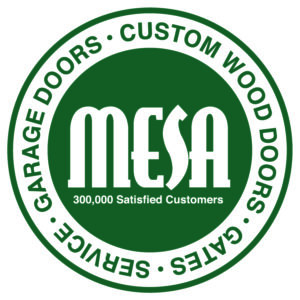Do I Need to Replace a Garage Door That Doesn’t Close All the Way?
Dealing with a garage door that doesn’t close all the way is an aggravating experience. It can leave your garage vulnerable to the elements and put your home’s security at risk. But do you have to invest in garage door replacement? Usually not; in fact, you can often fix the problem without a professional. There are also minor issues a pro can fix to get your garage door to close.
If the garage door stays partially open, try the following methods before calling a repair company:
- Inspect the Photo Eye Sensors: Located near the floor on both sides, these sensors detect when children, pets, or obstructions block the door’s path. Clean the sensors if they’re dirty. If a sensor is blinking, loosen one and adjust its position until both are aligned and the light stays on.
- Check the Tracks and Rollers: You can usually remove dirt or obstructions from the tracks. If a track is bent, use a hammer or clamps to force it back into position. Stuck rollers can be lubricated with white lithium or silicone-based grease. When a few are sticking, the garage door opener may react as if something is in the way.
- Adjust the Limit Screws: If your garage door doesn’t close all the way, the limit screws may need to be adjusted. Contacts on the screws determine how far the garage door opens or closes. Using a ladder, reach for the rear flap or light cover on the garage door opener and open it. Adjust the two plastic screws (labeled “Up” and “Down”) a quarter turn at a time with a flat screwdriver.
- Continue making adjustments until the door closes all the way. If the door bounces back up after closing, reverse the “Down” adjustment in small increments until it closes properly.
- Inspect the Trolley: The trolley may have been left in bypass mode the last time you disengaged the opener, or someone could have triggered it by accident. You can fix this by pulling the hanging rope toward the door. The trolley latch should engage and the garage door opener should work normally.
- Change the Remote Control Batteries: Dead batteries will prevent the remote from closing the door. If replacing the batteries doesn’t help, reprogram the remote. To do so, press the “Learn” button on the garage door opener and wait for a light to flash. Then press a button on the remote.
- Lubricate Moving Parts: Aside from the rollers, lubricate other moving parts such as the hinges, screw or chain, springs, bearing plates, etc.
- Tighten Loose Components: Screws and bolts can loosen due to vibration and cause misalignments in the garage door system. Tighten any loose hardware or fasteners you find.
When to Call a Repair Technician
If none of the above methods get your garage door to close all the way, pull down on the bypass rope to disengage the trolley. You should be able to close the door manually. To lock it, secure bolts through any built-in locking latches.
Your garage door may not need to be replaced. But it may need repairs if:
- The safety sensors don’t work after adjusting them
- An extension spring is broken
- A cable is worn or damaged
- A track is severely dented, misaligned, or twisted
- The rollers appear bent, cracked, chipped, or loose
- The door doesn’t stay in position when you test the door balance
- The garage door shudders, rattles, or makes loud noises
Contact Us If Your Garage Door Doesn’t Close All the Way
Mesa Garage Doors can fix virtually any problem with your garage door. But if your garage door requires constant maintenance, is excessively noisy, responds more slowly, or lacks the efficiency and safety features of new garage doors, contact us to discuss garage door replacement. We will provide professional advice and a free estimate. To get started, call (714) 988-6883 or contact us online.





